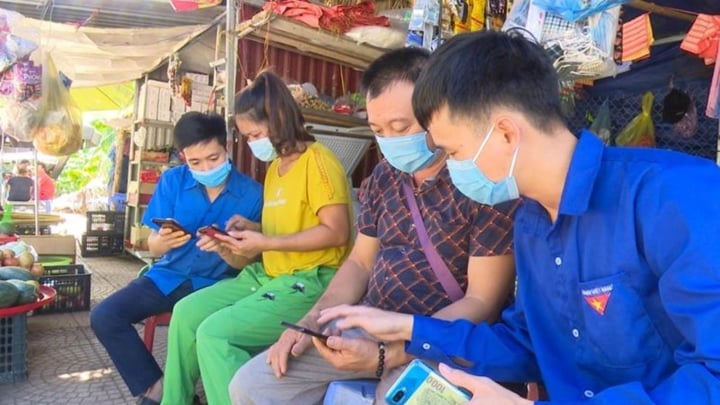The National Strategy for Digital Economy and Digital Society Development to 2015, with a vision to 2030, approved in Decision No. 411/QD-TTg dated March 31, 2022 of the Prime Minister, clearly defines the solution for organizing Community Digital Technology Teams (CNSCD Teams) in each block, village, and hamlet.
Team members are part-time officers and on-site members trained in digital skills to disseminate instructions and assist people in using digital technology and digital platforms Made in Vietnam, forming a nationwide technology deployment network.
On March 5, 2022, the Ministry of Information and Communications issued a document guiding the pilot implementation of CNSCĐ Teams at the local level. After more than 1 year, to date, 63/63 provinces and cities have established 74,422 CNSCĐ Teams and 348,362 members.

Of these, 52/63 provinces and cities have completed 100% to the commune level. Each group has about 4-9 members, of which the Head of the residential group, the local police, the Executive Committee of the Youth Union (branches, grassroots unions) and Digital Technology Enterprises are the core forces.
The task of the CNSCD Team is to propagate so that people know, understand and practice 5 basic digital skills: Using online public services, Online shopping, Online payment, Self-protection in cyberspace, Using other digital platforms depending on local characteristics.
According to a recent assessment report by the Ministry of Information and Communications, with the support of the CNSCĐ Team network, people's awareness and basic digital skills have improved, contributing to achieving initial results of the national digital transformation.
In particular, in the implementation of national digital platforms, nationwide scale, directly affecting the rights and responsibilities of people such as VneID, MOOCs online learning platform, National Public Service Portal, Online payment platform, online enrollment, remote medical examination...
Through the CNSCD Team, policies and guidelines on national digital transformation from the central to local levels, directly to the people, are implemented quickly, effectively and promptly.
“ In the process of applying information technology in the past and digital transformation today, this is the first time that the policy from the Central Government has spread rapidly in a short time. This is a particularly breakthrough result ” – The report of the Ministry of Information and Communications commented.
Some localities have deployed outstanding activities of the CSCĐ Team such as Quang Ninh province, Binh Thuan province, Binh Phuoc province.
Quang Ninh Province has some localities that have creative ways to encourage and motivate the CNSCĐ Team. For example, Van Don district gave each CNSCĐ Team a smart mobile phone with an activated SIM card; Tien Yen district organized a booth to promote and introduce digital transformation at the Golden Season Festival, San Diu Ethnic Festival, and Dao Ethnic Festival.
In addition, every Saturday evening at the walking street, the district also organizes propaganda to people about digital payments, cashless payments (mobile money), instructions on installing and using digital social insurance books (VssID), electronic health books, and VNEID electronic identification application.
In Binh Thuan province, the CNSCĐ team has promoted the use of digital platforms such as submitting administrative procedures online via the National Public Service Portal and the Provincial Public Service Portal; online payment; putting products on e-commerce platforms, etc.
Many business households are trained in e-commerce knowledge to open electronic payment accounts using digital platforms and digital technology to post photos, promote products, create booths, receive orders, etc. to improve sales efficiency and develop household economies.
In Binh Phuoc province, the Dong Xoai City Social Security Team closely coordinates with businesses in the province to support people in using cashless payment services, while creating opportunities for local people to access and experience preferential forms and policies from credit institutions, payment intermediaries, retailers, and service providers to build people's habit of cashless payment.
Linh An Trang
Source



![[Photo] Discover the beautiful scenery of Wulingyuan in Zhangjiajie, China](https://vphoto.vietnam.vn/thumb/1200x675/vietnam/resource/IMAGE/2025/5/11/1207318fb0b0467fb0f5ea4869da5517)
![[Photo] Prime Minister Pham Minh Chinh chairs the fourth meeting of the Steering Committee for Eliminating Temporary and Dilapidated Houses](https://vphoto.vietnam.vn/thumb/1200x675/vietnam/resource/IMAGE/2025/5/11/e64c18fd03984747ba213053c9bf5c5a)
![[Photo] National Assembly Chairman works with leaders of Can Tho city, Hau Giang and Soc Trang provinces](https://vphoto.vietnam.vn/thumb/1200x675/vietnam/resource/IMAGE/2025/5/11/c40b0aead4bd43c8ba1f48d2de40720e)

![[Photo] The moment Harry Kane lifted the Bundesliga trophy for the first time](https://vphoto.vietnam.vn/thumb/1200x675/vietnam/resource/IMAGE/2025/5/11/68e4a433c079457b9e84dd4b9fa694fe)
























































































Comment (0)